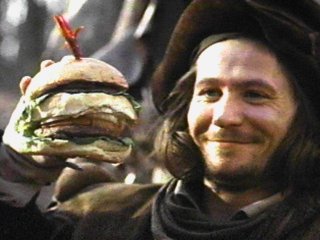Rosencrantz And Guildenstern Are Dead
I tried to watch this movie several times before actually completing it the entire way through. It's not that I didn't like it. In fact, I've liked it each time I've sat down to watch it. Like a lot of masterful British comedy, it's complex and silly at the same time, so even when it's going completely over your head, you still find yourself chortling at the pratfalls and shenanigans.
I kept turning the film off over the years before I felt like I wasn't "getting it," that I had become lost for some reason and should watch it over again from the beginning. It was only a few years ago, in college, that I finally made the realization that not getting it was the point. This movie follows around two minor characters in a play who don't actually understand that they are minor characters. They think they're important characters. Oh, and they don't know that they're in a play exactly either, although they do begin to get suspicious when they find themselves with no control whatsoever about their destiny.
I think it's pretty clear that Stoppard means all this goofiness as a sort-of existential metaphor for life, and though that comes through when reading the play, I'm not sure the movie quite gets there. But as a wonderfully funny, clever exercize in meta-meta-metafiction, Rosencrantz and Guildenstern Are Dead succeeds triumphantly.
People not familiar with Shakespeare's "Hamlet" would do well to give it at least a cursory glance before watching Rosencrantz and Guildenstern. Any attempt at all to follow the logic of the film depends on at least some familiarity with the story of the so-called Melancholy Dane. I've never really liked that nickname for Hamlet, by the way, as he's not so much melancholy as bitter, confused and pissed-off. But you get what I'm saying.
Rosencrantz and Guildenstern were Hamlet's good college buddies. They're called to Elsinore by the newly-crowned King Claudius, who took over the throne following the untimely demise of his brother, Hamlet's father. Hamlet suspects his uncle of the murder, particularly because, you know, the guy married his mom. Oh, and cause his dad's ghost tells him all about it. So, anyway, Hamlet starts acting strange and his uncle calls in his college friends to essentially spy on him. Find out what he knows and why he's acting strange, and then report back to the king, essentially.
Playwright Tom Stoppard has called Rosencrantz and Guildenstern the two most boring characters in all of Shakespeare. They serve an entirely functional role in the actual play "Hamlet" - their intrusion on his life tips Hamlet off that his uncle suspects he may know too much, and provides the audience a glimpse into the true nature of his madness (namely, that he may be faking it). Then, they accompany Hamlet to England and disappear from the action of the play.
So in casting them as the heroes of his production, Stoppard alerts you instantly to his intent. These are two guys who exist on the margins, who don't matter, who unknowingly take part in the great events of great people without really noticing or concerning themselves. In other words, they are us, carried along by events totally out of control, only barely perceiving the forces that move them here and there, unaware of the true nature of their existence.
But I'm making it sound heavy and daunting. In fact, the movie is a gleeful delight. Stoppard has a true gift for dialogue. As Rosencrantz and Guildenstern (Gary Oldman and Tim Roth) mill about the grounds of Elsinore having elliptical, non-sequitur discussions about life, fate and invention, Stoppard's given countless opportunities to demonstrate his verbal wit. Oldman and Roth, two of Britain's most popular and charismatic actors, are wonderful in their roles (though neither can say which is Rosencrantz and which is Guildenstern, their identities being totally interchangable), speaking Stoppard's occasionally heady words with deft ease.
Richard Dreyfuss gives a fun, oversized performance as well as the Player King, the head of a traveling group of performers stopping by Elsinore Castle. In the action of "Hamlet," they put on the play "The Mousetrap," mirroring the murderous actions of Claudius back at him. In Rosencrantz and Guildenstern, they put on several masquerades, fortelling future events for the main characters, reminding them that nothing they do or so can change their fate. The future is already written. They are but characters, puppets, pawns, actors on a stage. By the end of the film, Dreyfuss' character has morphed from a traveling actor into the controlling force behind all of the film's action. Stoppard in this way suggests the entire film we've just seen is simply another artifice, another "story" into which these two identity-less men have been dropped.
So, I'm going on and on and making the film sound boring, I know. But it isn't. You'll just have to trust me. As for the DVD that came out today, it looks pretty good, though the transfer isn't exactly sparkling or clear. It retains the low-budget PBS kind of look, but for this material, that's really alright. The special features, however, are lacking, particularly considering that the film is a 2-disc set that's priced as such. You get interviews with Stoppard, Oldman, Roth and Dreyfuss, but they're rather mundane interviews. Stoppard, for example, is asked to recall many of the details of pre-production on the film, including the long stories behind the casting of Tim Roth and arranging of the finances. I don't care about that sort of business-talk. I want to hear where he came up with his ideas, how he knows when a play is done or if it needs more work, how many times he had to read "Hamlet" in order to interalize all that play's emotion enough to write Rosencrantz and Guildenstern.
But it's not that kind of interview. Too bad.

1 comment:
Is that an egg burger?
Post a Comment